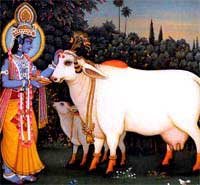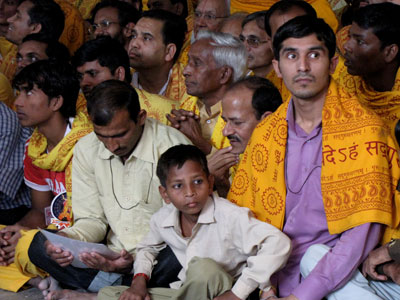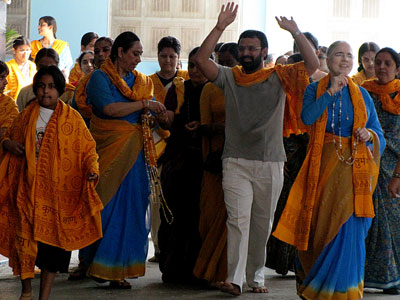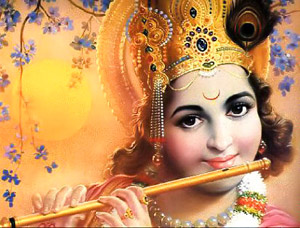(Synopsis of a talk given by Jagadguru Shri Kripalu Ji Maharaj on November 14, 2009, in Karnal, India)
There are two types of human beings – those who have understanding and those who don’t. Those who understand are few. Those who don’t understand are in the majority. The ones who can distinguish between the knowledgeable and the ignorant are also very few in number. Everyone thinks they are knowledgeable. The first sign of ignorance is thinking that you are knowledgeable.
If you say to someone that he is ignorant or a fool, he feels hurt. He might start arguing and possibly get into a fight with you. It was asked of Shri Krishna, “Who is ignorant?” He replied, “The one who identifies himself with his body.” Now you all can think about this when you are alone: Are you ignorant or knowledgeable? Do you think you are the body or something more?
One class of ignorant person considers himself to be the body; more ignorant than this is the person who believes he is a man or a woman; even more ignorant is the one who believes he is a brahman, kshatriya, vaishya or shudra, and even more ignorant is the one who thinks he is Punjabi, Gujarati, Madrasi, Bengali and so on. Now when you are alone, think about which class you are in.
After all, this was Shri Krishna’s answer, so He won’t make a mistake in His response. Someone considers himself to be a human being. Then what happens? A human body is related to other human bodies, to a mother, father, spouse, several children and all of our other relatives. Our mind is attached to all of them.
Someone is being attacked. You ask, “What’s happening?” “Sounds like someone is getting a beating.” “Who?” “Oh, it’s Ramesh.” “What?! That is my son!” What happened? A moment ago you were relaxed, and now you are anxious, “But it’s my son!” The person standing next to you is laughing at your condition. You are feeling distressed because you are the father and Ramesh is your son. When any of your family members experience pain, you suffer along with them, and this is all due to identifying yourself with the body.
If you were not to identify with the body, then you would not feel related to others. When you don’t feel this emotional attachment, then even if someone else is suffering, you internally remain at peace. Everyone must undergo physical suffering. You already undergo mental suffering like lust, anger, greed, jealous, animosity and so on, and on top of this you share the suffering of others due to your attachment.
In spite of this, when we say to each other, “How are you?” We say with a smile, “I’m alright!” We are experiencing so much suffering, but we respond with a smile and say we are alright. We are fooling the other person when we say this, because the fact of the matter is that everything is all wrong.
Why are you suffering? “I don’t have any money. I can’t find enough to eat.” And Mr. Millionaire, why are you unhappy? “Money has made me unhappy.” What? How could that be? You are a millionaire. “Yes, but I’m not a billionaire like my neighbor.” You may have read that the Ambani brothers, the richest family in India, are fighting with each other. Over what? Fifty billion dollars. For this reason there is a case in the Supreme Court at the moment, and the expenses related to this case will amount to 10 billion dollars. And the suffering they experience from the animosity they feel towards each other is in addition to this.
Just think – you may desire to have a million, but just see the condition of those who are billionaires. If you were to get one million, you will desire two. If you were to get two, then you would ask for four. You can never be happy like this. This disease is just like a fire that someone pours ghee (clarified butter) on. Why are you doing that? “Oh, I want to extinguish the fire.” But you have applied something that will only make the fire grow stronger.
So the one who is ignorant is the one who considers himself to be the body. This is the sole cause of all suffering. Who is knowledgeable? The one who considers himself to be the soul. Apart from the soul, there are two other entities, Maya and God. The question is which of these two belongs to you? The one who understands and believes this is truly knowledgeable. Just knowing this is not enough. A person can come to know this, but he must also believe it.
So we want happiness, peace, pleasure – we don’t want unhappiness or suffering. So which of these two entities, Maya or God, has the happiness we desire? This has to be understood.
This world is not related to us. This is our practical experience. How do we know this? We receive happiness from the same object that causes another to suffer. If that object had been a true source of happiness, then everyone would experience happiness from it. A drunkard feels happy when he hears the word ‘wine’, but a priest feels insulted if you hears the same thing. If there were happiness in wine, then the priest should also experience the same joy as the drunkard. The word ‘wine’ would be like music to his ears, but it is not. Then from what could everyone experience happiness, and that, too, all the time and in the same way?
Someone from an extremely poor home couldn’t even afford a bicycle. Today he got one. He is extremely happy. Now he can ride to work and arrive early. But his neighbor just bought a motorcycle. Now he feels sad, “A bicycle is useless!” Now he got a motorcycle. But his neighbor purchased a car. “What is the point of having a motorcycle. I need a car!” This disease is so pervasive it even exists in the celestial abodes. Everyone experiences suffering by seeing someone who has more than himself. By seeing those who have less then us, we forget our suffering and feel happy. “He has a bicycle, but I have a motorcycle!” In life there are those ahead of us and behind us, but everyone is experiencing suffering.
That same object we experience happiness from will also cause us to experience sorrow. A son obeyed his father’s request. The father was happy and gave him a hug. The second time, the son didn’t pay any attention to his dad. He also ignored him a third time. Finally the father scolded and slapped the son. What happened? You were just hugging him! We feel attached and detached from the very same mother, father, and spouse 10 or 20 times a day, depending on whether or not they are fulfilling our self-interest.
If there were happiness in any of these relations, we should constantly experience it. But instead it always steadily decreases. This is true of everything that gives us happiness in the world. So we need to think deeply about the nature of our world. We have hugged our loved ones thousands of times, but there has always been a difference in the feeling of happiness from person to person, and times have come when we felt so adverse to them we didn’t even want to look in their direction, “It would be good if he died! My life has been ruined by getting such a spouse! How did I get such a terrible son!” and so on.
So if there is no true happiness in this world then this means it must be in God, because there is no third entity. This understanding has to become firmly seated in our minds. Our situation is like a dog, who runs to a man who is showing him a piece of bread. As he comes close to the man, the man hits him with a big stick. The dog runs away crying in pain. When he is at a distance, he looks back angrily at the man. The man shows him a piece the bread again and the dog thinks, “Never mind, he is giving me something to eat.” He runs towards the man wagging his tail, and again the man hits him with a stick. When we have problems with our relatives, we feel emotionally detached from them. Then after some time, we feel attached again.
So if someone thinks deeply about this, he will come to the realisation that there is no true happiness in this world. In other words, he will realise, “My kind of happiness is not here.” My means ‘what belongs to me’. Me means what is not ‘mine’, such as my body, my mind, my intellect. What is mine cannot be me. We don’t say, “I am the house.” We say, “This is my house.”
So you have a body; you are not the body. The ‘you’ that came into this body is such a power that it enabled this lifeless body to become active. With that power, you began to see, hear, smell, taste and touch and think. When it left, then this body became lifeless, dead. So we are that soul.
What belongs to us, the individual souls, is God. What belongs to the body is this world. Because we are a part of God, our happiness lies in God. This world is for the maintenance of the body. If someone intends to meditate on God for 24-hours, after some time he will feel hungry, and then he will forget about God. So the body requires the same elements it is comprised of to function. The body was created from material elements in the mother’s womb. And God created this world out of the same elements to support the body’s functioning, and that, too, was done with such variety that there are thousands of different kinds of foodstuffs – that is how great our divine Father is! He did all this for the body, not for you. He said, “I am the one for you.”
This needs to be continuously understood. You refer to and believe your worldly father is your true father. You feel this continuously. But you should not feel that the father of your body is the father of your soul. The father of the atma is paramatma. Don’t feel that what gives happiness to the body also gives happiness to the soul. This is a deception. The world is for the maintenance of the body. The soul’s happiness is only found in God. Just this much has to be understood. The whole essence of all the scriptural teachings is just this.
Even if someone were to study all the scriptures, he would come back to this point: I am a soul, my happiness is paramatma, Shri Krishna. This is my body, and for its maintenance God created the world.” Both are necessary – God and the world. You have to make this understanding firm through repeated thinking. In the past, you have done the reverse and thought that everyone and everything in the world was yours. You did some spiritual practice, realized the truth, and then forgot it, because you did not repeatedly review this understanding. The scriptures say to listen to spiritual philosophy from a true Saint, then review that understanding over and over again so it becomes practical and firm, and then you will attain your ultimate aim.
© Radha Govinda Samiti and Bhakti Bliss
Read Full Post »


 A festival dedicated to Lord Krishna, Gopashtami, was celebrated on October 26 in Bhakti Dham, Mangadh, during the 2009 annual sadhana camp.
A festival dedicated to Lord Krishna, Gopashtami, was celebrated on October 26 in Bhakti Dham, Mangadh, during the 2009 annual sadhana camp.




 Every soul is unhappy and dissatisfied. We work every moment to be freed from these feelings. There are many kinds of suffering that you know about and have practically experienced uncountable times since eternity. Primarily these are of two kinds: physical suffering and mental suffering. All other kinds of suffering are included within these two.
Every soul is unhappy and dissatisfied. We work every moment to be freed from these feelings. There are many kinds of suffering that you know about and have practically experienced uncountable times since eternity. Primarily these are of two kinds: physical suffering and mental suffering. All other kinds of suffering are included within these two.


 ‘Ra’ se sab bhagen pap Govinda Radhey,
‘Ra’ se sab bhagen pap Govinda Radhey, Radhey nam sunatahin Govinda Radhey,
Radhey nam sunatahin Govinda Radhey, Radhey nam ‘Ra’ ko suni Govinda Radhey,
Radhey nam ‘Ra’ ko suni Govinda Radhey, Radhey nam sunatahin Govinda Radhey,
Radhey nam sunatahin Govinda Radhey,



